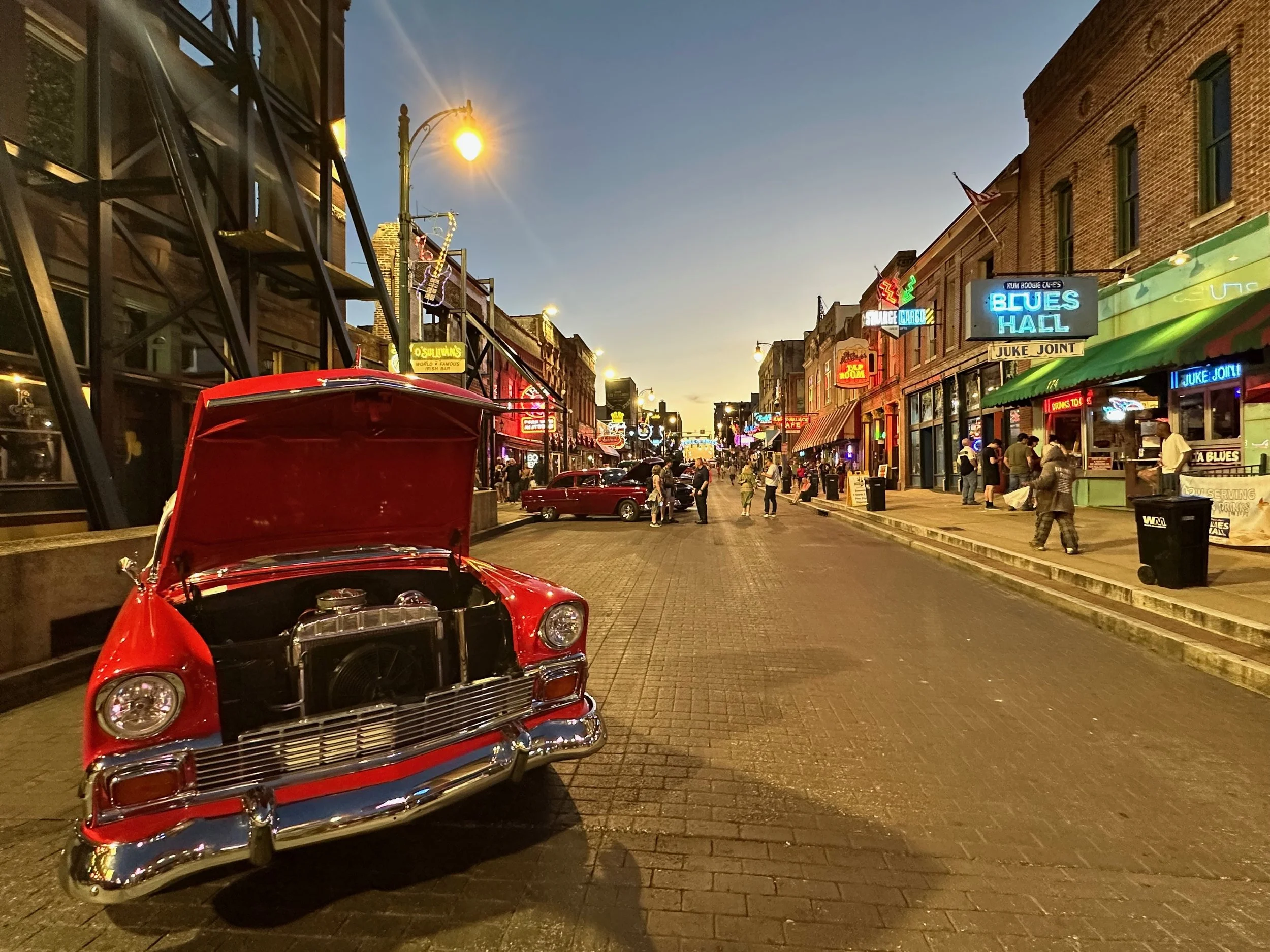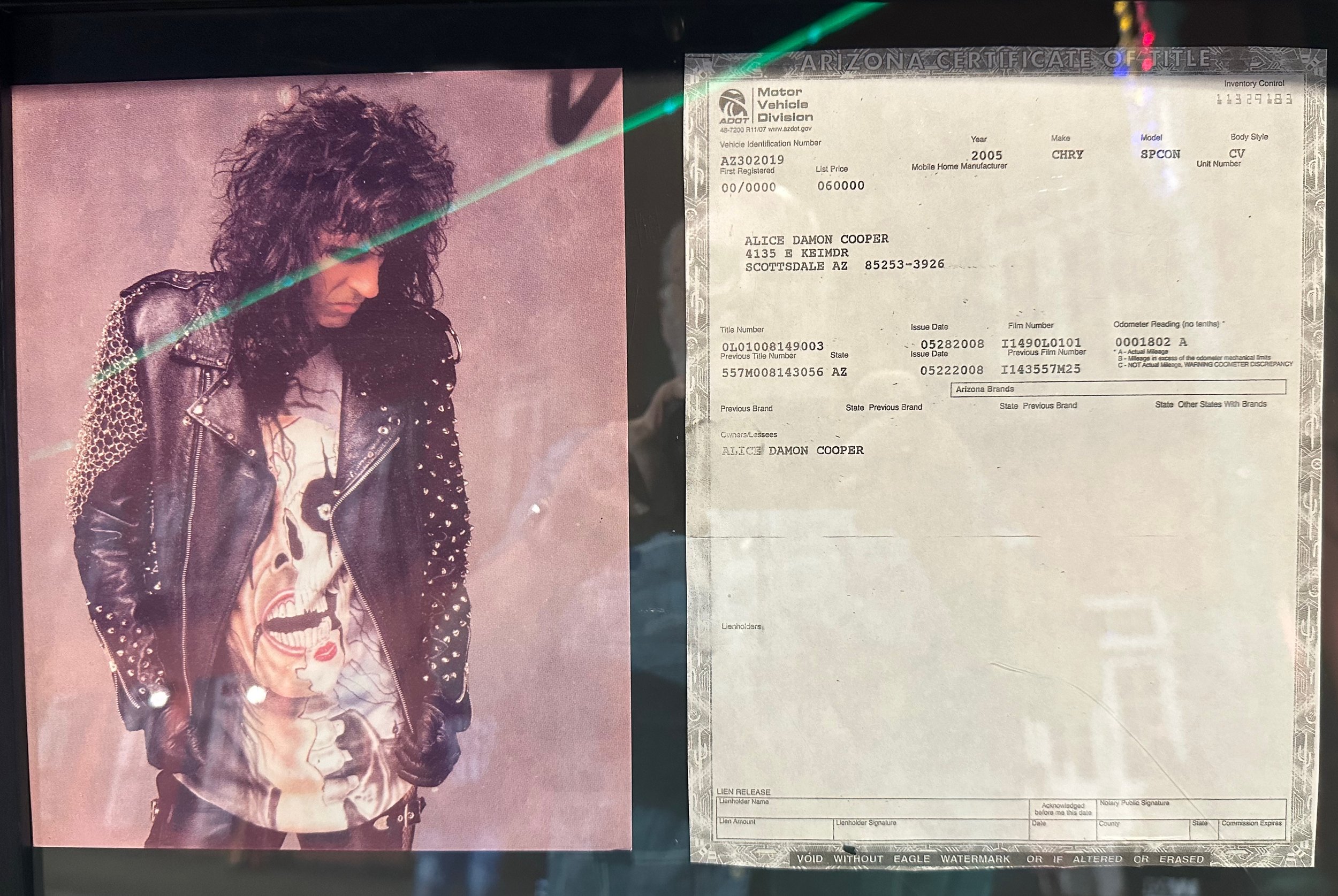Memphis
Although just 200 miles apart, in the same state and both with a rich musical heritage, Memphis feels like another country to Nashville. As if some invisible border point has been crossed on the I-40 that connects the two cities.
I get a taxi into the city from my motel out by the airport. Even though it’s 17:30 in the afternoon, the roads are quiet and downtown is deserted. Like Burton-on-Trent on a Sunday afternoon in the 1970’s.
McEwan’s looks to be the best bet for dinner in a not-very-crowded field. They deliver what they say: upscale Southern Cooking in a restful, cool, dark-panelled room while the late afternoon sun bears down outside.
The selection of bourbon whiskies they have is extensive. There are 137 of them. Some are listed as being 131º of alcohol. To anyone unfamiliar with this scale, that’s nearly two-thirds pure ethanol.
I ask the bartender how people drink the 100º plus stuff and she just looks puzzled.
“What do you mean?”
I mean, with ice, water, neat, a mixer, with a cocktail-umbrella??
“Oh, mainly neat but some have a single ice cube”
The brain-pickling ones are all in the $50 to $80 range for a large shot so, as a digestif, I go for the $20, 100º Blue Note Crossroads with a single cube.
I’m amazed at how rich and dangerously easy to drink it is. Not a bit like the firewater I was expecting.
Beale Street is the cousin of Broadway in Nashville and my next stop. Again, it’s quiet by comparison. So much so that it allows for the promenading of classic American cars, each meticulously restored, for the main stretch between South Second Street and BB King Boulevard.
At one end is a recent Chrysler model, heavily customised, previously owned by Claudia Winkelman look-a-like, Alice Cooper and before that, somebody from Van Halen. It’s pumping out music at such a volume, the pavements are literally shaking. The engine is running the whole time as this rig would flatten the battery in seconds.
This mobile environmental disaster zone is now the proud possession of one DJRob, whom I attempt to engage in conversation. Like the superstar he most surely is, he just ignores most of my questions, but does respond when I ask him how many watts the system generates:
“Abat sex tharsun” is his effusive reply.
I mention I know of a young Swedish woman called Greta that might be interested in taking it off his hands, when the time comes to trade it. This barely elicits a grunt. Some fell on stony ground…
The Rum Boogie Bar is opposite and a tortured guitar is a siren call through the awful dub racket DJRob is playing.
$5 later, I’m in a 50% occupied bar watching a six-piece ensemble wrestle to the ground a series of blues anthems. Most are unfamiliar to me, but performed so hypnotically it just doesn’t matter.
The inclusion of a trombone and vintage Hammond organ adds drama and tension to the sound. The expression on the face of the organ player suggests this is not so much a performance as an exorcism. After an hour, they troop off drained, but vowing to return in thirty minutes, giving me time to look around.
Guitars are hanging from the ceiling, donated by artists who have performed here. I kind-of expected to see U2 and Sting represented, but I didn’t realise Billy Joel even played the guitar.
Among the curiosities are Soul Asylum who, with the exception of the exceptional ‘Runaway Train’, never troubled the chart compilers, and James Blunt, whose cut-glass English warblings I can’t quite see cutting it here.
The band return and the grim tale told by ‘Hey Joe’ unfolds again:
“Hey Joe, where you goin' with that gun in your hand?”
I abandon plans for an early night, order another IPA, sit back and soak it up. The musicians - other than the keyboard player - remain studiously unmoved by the magic they are creating.
Like Nashville the night before, the passion in the performance is the same but there’s a visceral, gritty anger and dignified resentment at work that reflects the city. Even the appeal for tips has a hard-edged humour to it as the leader says he needs them for child support payments.
Nashville welcomes you and clasps you to its ample bosom, begging you to stay. Memphis doesn’t give a fuck whether you choose to come or go.
27 May 2024
Considering he was the best-paid artist of his time, it’s surprising Elvis Presley chose to live within a few hundred yards of a thundering main road. The Graceland ‘mansion’ itself is a relatively small part of the theme park it is the centre-piece of. I’d been in two minds whether to book or not, and book you must: four weeks earlier, I bagged one of the few remaining places for today.
On one hand, I’ve never really understood Elvis, nor particularly liked many of his records. But I’m aware of what a profound effect he had on many artists I admire, Bruce Springsteen and Billy Joel being two of many.
As a tourist experience, it is pretty grim with queues, crowds and officious battalions of security yelling at people if they stray from the ordained path or touch anything they shouldn’t.
Even by 1970s standards, the interior design is off-the-scale awful, but it’s claustrophobic in a way that shouldn’t be possible in a 10,000-square-foot property. Principally, all the ceilings are too low.
He bought it, aged 20, in 1957 for $100,000. About $1.1 million in today’s money so not a fortune. All in, it's just another case of what happens when a poor boy gets too much money, too quickly and before character, taste and judgment are fully formed.
One of the worst lapses is a huge, agricultural-looking building in the grounds. These are otherwise beautiful: 13 acres of manicured, undulating parkland. I assumed this monstrosity to be some recent addition as a result of turning Graceland into the tourist destination it is. But it’s original and houses a racquetball court, lounge and changing rooms built by Elvis in 1974 after he’d become very keen on the game.
The audio commentary explains that, on 16 August 1977, he’d enjoyed a few sets with friends in the morning. He then played and sang two songs on the upright piano in the lounge behind the glass-backed court: ‘Blue Eyes Crying in the Rain‘ and ‘Unchained Melody’, the Righteous Brothers classic.
Returning to the main house to get ready to fly to Portland, Maine for a concert that evening, he died shortly afterward.
The commentary pauses and the sound of ‘Unchained Melody’, on a solitary piano, accompanied by that unmistakable voice echoes spectrally around the empty racquetball court.
Muriel Wilkins used to play piano, every Friday at the Hollywood Cafe in Tunica, over the state line in Mississippi. If that phrase sounds familiar, It’s because I’ve lifted a chunk of it, almost intact from Marc Cohn’s ‘Walking in Memphis’, a breakthrough hit from his eponymous 1991 debut. If you’ve never listened to this album in its entirety, it’s well worth a go as it’s a near-perfect example of the singer-songwriter genre.
The cafe has now been commemorated by the Mississippi Blues Commission and Muriel’s piano, together with various signed pictures of Cohn, are proudly displayed.
One includes a message of heartfelt thanks for the inspiration from Cohn. He had visited, in 1985 as a respected but otherwise anonymous session musician. Muriel died in 1990, so she likely never heard the song that immortalised her.
Cohn wasn’t the only artist to make the twenty-mile trek south out of the city to see Muriel play. Above the piano is a gallery featuring many others, including Michael Jackson.
Inevitably, I have catfish and ask the waitress how best to have it, from the available options of grilled, blackened or fried.
“Fread..” she says with an evil glint in her eye, suggesting she knows she ought to be recommending healthier options.
I head back into Memphis to visit the restored Lorraine Motel. I’m not staying there as it’s not a refurbishment in the usual sense. It’s where Dr. Martin Luther King was assassinated on 4 April 1967, and is now the National Civil Rights Museum.
The museum is imaginative and effective at every level. The superstructure of the motel has been retained, along with the exterior design and signage, but inside is a carefully orchestrated maze visitors must follow. The message is very clear: the fight for civil rights is an important story and you are bloody well going to hear it.
The rooms include awful details of the 330 years of slavery that persisted before the Civil War. Intriguingly, the narrative also implies it was a strategic advantage rather than a functioning moral compass of the Unionists, that caused many slaves to fight on behalf of the Union. The assertion is Lincoln only offered abolition as a means of weakening the ranks of the southern, Confederate forces.
The bus where Rosa Parks had her famous altercation is displayed along with dignified sculptures of all participants. The Birmingham jail cell where Dr. King was incarcerated and wrote the famous open letter has also been installed.
Inevitably, the grim conclusion of the tour is the two motel rooms occupied by Dr. King and his colleagues, along with the balcony where he suffered the fatal wound. The rooms have been recreated using FBI photographs as the source to be as they were at 6:01 PM on that day when he was hit with a single shot fired from the boarding house opposite.
It is a tough but necessary couple of hours to endure. The sense of tension and unease that permeates this city is now starting to make more sense.
For a bit of light relief, I then go and wait patiently at the Peabody Hotel for the 17:00 Duck Walk.
This tradition started when the owner and General Manager of the hotel returned from a hunting trip with his friend, having drunk too much Tennessee whisky. Guns and 100º + liquor… What could possibly go wrong?
They thought it would be wildly funny to let loose some of their live ‘decoy’ ducks (those used to attract other ducks for the purpose of shooting them) in the hotel foyer. Well, it probably seemed like a good idea at the time. Anyway, the ducks headed straight to the fountain, the locals loved it and thus the tradition was born.
These days, the ducks make two scheduled appearances: 11:00 in the morning when they waddle from the elevator to the fountain and 17:00, when they retrace their steps to be whisked back to their suite.
As you can see, it’s all very sweet, lovely and heartwarming and is in stark contrast to most of the last two days.
Memphis is a tough, important city that demands your attention. Nashville may capture your heart but Memphis will stir your soul.
























